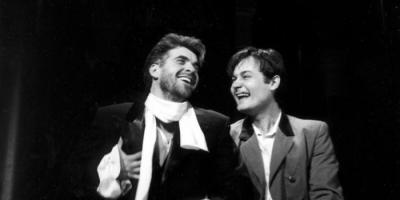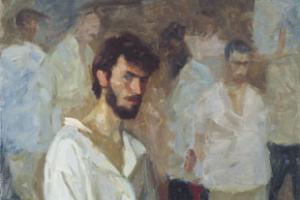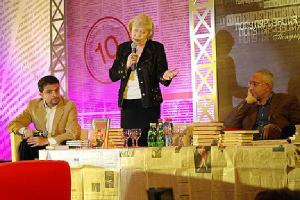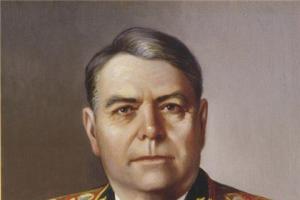(the essay is divided into pages)
The comedy “The Forest” by A. N. Ostrovsky, written in 1870, in post-reform times for Russia, reflected all the processes taking place in society, however, affecting them,
Ostrovsky focused his attention most of all on the moral aspect of changes in public life. The playwright showed that the old morality is dying out, and the individual, freed from the shackles of society, does not know how to behave. Opening a decade of family novels, the play examines the problems of choosing moral life behavior by heroes - members of the same family.
At the center of the play is the landowner of the Penki estate, Raisa Pavlovna Gurmyzhskaya, famous throughout the entire district for the “severity of her life.” Like Kabanikha from the play “The Thunderstorm,” the most important thing for Gurmyzhskaya is compliance with external forms of decency, because to those around her she seems like a “pious woman,” modest, noble.
The owner of the “Penki” estate, in her words, ready to help with everything, “only a clerk of her money” that belongs to the poor, mindlessly sells off the forest, the huge estates of Gurmyzhskaya are melting, they are being bought up by “yesterday’s man,” the merchant Vosmibratov. At the same time, the merchant shamelessly deceives the landowner, receiving from her a receipt for the money before he gives it to her. If it weren’t for Gurmyzhskaya’s nephew Neschatlivtsev, who with all the fervor of his youth attacked the merchant who dared to deceive her, the prudent Vosmibratov would have managed to “twist” the mismanagement of the landowner. It is no coincidence that the landowner herself sells the forest: Ostrovsky shows that the noble way of life is being destroyed from the inside.
Greedy to the extreme, Gurmyzhskaya skimps on helping her “poor relatives.” She regrets money for the dowry of her niece Aksyusha, she also regrets money for the education of her nephew. At the same time, Raisa Pavlovna assures those around her that she deliberately does not help Gurmyzhsky, because “in excess of education” there is “corruption of morals.”
However, from Karp’s conversation with Ulita, it becomes clear to whom Gurmyzhskaya’s money is “flying in the thousands”: Karp talks about how the lady squanders her money with her lovers. Initially, settling a dropout high school student, the son of a friend, Bulanov, in her home, she strives to do a “good deed” and marry him to her niece, but then she decides to marry the “poor boy” herself, leaving the girl without any help. Trying to hide her connection with Bulanov, she assures those around her that he is her niece’s fiancé, and therefore even refuses the wooing Peter Vosmibratov.
The playwright shows that such vicious behavior is so pernicious that it can “infect” the people around him. Thus, Gurmyzhskaya has an ominous reflection in her maid Ulita, and Gurmyzhskaya’s relationship with Bulanov is, as it were, projected onto Ulita’s relationship with Schastlivtsev, to whom she secretly brings a bottle of “milk from a mad cow” and with whom she shares her misfortunes. “You are crawling, crawling in front of the lady, that is, worse, it seems, than any last creature...,” she says to Neschastlivtsev’s comrade. “And how this fortress disfigures people.”
A vicious immoral circle is created, and not only Gurmyzhskaya’s servants are subject to its influence, but also the neighbors, who are also infected with this “ugliness.”
Bodaev and Milonov are provincial landowners, whose ideal is in the serfdom past. Being a retired cavalryman, Uar Kirilych Bodayev is somewhat reminiscent of Skalozub Griboyedov: he is the same rude, straightforward person, and therefore in his remarks to Gurmyzhskaya and Bulanov (“he’s lying, lying, he’ll squander everything,” “...let him serve, we’re unscrupulous”) more frank than Milonov.
The beautiful Evgeniy Apollonovich Milonov, who is “exquisitely dressed, in a family tie,” makes sweet speeches about virtue and yearns for the bygone times of serfdom. He is characterized by rare verbiage; he speaks of the marriage of Gurmyzhskaya and Bulanov as a “union” of “unshakable virtue, worldly wisdom, strengthened by experience...” with “the tender young passion of a noble nursery.”
Ostrovsky is known in literature as the “discoverer” of such a class as the merchants. It was he who first identified this type as a serious literary object, proved that this hero is also interesting and deserves no less attention than his predecessors, primarily the nobles. In this regard, Ostrovsky belongs to the writers of the so-called “natural school”, which in the second half of the 1840s. included such authors as Gogol (with some reservations), early Dostoevsky, Nekrasov, Grigorovich.
Petty officials, station guards, organ grinders, inhabitants of the “bottom”, who became the heroes of their works, represent a remarkable phenomenon in Russian literature. Like his comrades, Ostrovsky portrayed such people in their usual environment, conducting their everyday conversations, paying attention to all sorts of little things, which, however, successfully complemented the overall portrait. The author's main achievement is probably that he managed to destroy the established image of a drunkard merchant who does not care about anything, and somewhat elevate him in the eyes of the reader. For example, the merchants Knurov and Vozhevatov ("Dowry", 1879), it seems, have a decent education, and therefore, probably, a fortune. At the beginning of the play, Knurov reads a newspaper, and not just any newspaper, but a French one. The shady traders from “Groza” never even dreamed of this. In general, educated merchants are rare in Ostrovsky, and ideal ones are completely absent. The same Knurov and Vozhevatov, using their wealth and power, gamble the fate of Larisa Ogudalova, deciding (without her knowledge) which of them will take her to the fair. In "The Thunderstorm" the reader encounters somewhat exaggerated portraits of merchants disfigured by the presence of power (Kabanov and Dikoy).
These are basically Ostrovsky's merchants. Their main problem is money. If there are not enough of them (relatively speaking, of course), then all the merchant’s worries are where and how to get them (these issues are usually resolved in favor of some kind of deception); if there is a lot of money, then, in principle, the goal does not change, which speaks of greed, and, in addition, there is also added concern about how to protect this wealth. This is how merchants live: they underpay their employees, give (sell) their daughters in profitable marriages, and cheat customers. The only thing that unites them is that, paradoxical as it may sound, everyone speaks for himself and pursues personal gain in everything; This is their peculiar way of life.
Despite all this darkness, in almost every play a “ray of light” (in Dobrolyubov’s words) bursts out from the depths, foreshadowing the imminent end of the kingdom of darkness, or the “villain” is defeated, vice is exposed and justice triumphs.
Consider the drama "The Thunderstorm" and the comedy "The Forest". In both works, in the foreground there is a “dense” family, the house is controlled by a very willful woman (Kabanova - Gurmyzhskaya), whose oppression the girl living in her care (Katerina - Aksyusha) is forced to endure; at a certain moment a person appears on the scene who disrupts, although painful, but relatively calm life. The works develop different conflicts, and situations too (except for the above similarities), but the general idea that permeates their plots is the same. After analyzing both plays, all this can be noticed.
In The Thunderstorm, Ostrovsky, using a small number of characters, managed to reveal several problems at once. Firstly, this is, of course, a social conflict, a clash between “fathers” and “children”, their points of view (and if we resort to generalization, then two historical eras). Kabanova and Dikoy belong to the older generation, who actively express their opinions, and Katerina, Tikhon, Varvara, Kudryash and Boris to the younger generation. Kabanova is sure that order in the house, control over everything that happens in it, is the key to a healthy life. The correct life, according to her concepts, is to follow the house-building orders and unquestioningly obey the elder (in this case, her, because she sees no other suitable candidate). Seeing that not all of her demands are being met, she fears for the future, both hers and her children’s, because her world is collapsing, and what should come to replace it seems chaos to her. She is trying with all her might to maintain the old order, because... He simply cannot live any other way; Therefore, the figure of Kabanova takes on a tragic connotation. In Diky, on the contrary, there is no hint of tragedy. He is confident that he is right and that everyone around him depends only on him, so he allows himself to do unimaginably vile acts, which is typical tyranny.
The younger generation looks at things a little differently. All of them, with the exception of Boris, who for some unknown reason tolerates his uncle’s willfulness, to one degree or another express protest against oppression by their elders. Kudryash scolds Dikiy, thus not allowing himself to be offended. Varvara goes for walks at night, secretly from her mother, and then runs away with Kudryash. Boris, as already mentioned, endures Dikiy’s bullying and thereby shows some kind of inability to live independently. Such is Tikhon. His absolute dependence on his mother is due to the fact that he grew up in an environment where someone necessarily commands, and someone obeys.
The most difficult and tragic fate is Katerina’s protest. Without clearly understanding what she needs, she knows one thing: she can’t live like that. Of course, she is part of the patriarchal Kalinov and lives by his laws, but at some point all this becomes unbearable for her. The “dark kingdom” gives a crack, and through it, from its very depths, a “light ray” breaks through. Katerina’s unclear desire to escape from this musty world somewhere (she is a maximalist, like Kabanova, only one option is possible for her: either everything or nothing) led her into the river, but thereby she resolved the conflict with her own destiny in her favor: Instead of the fate prepared for her to exist within four walls, always trampled upon by her mother-in-law and husband, she chose freedom, even at the cost of her life.
In "The Forest", of course, there is no such tragic ending, and in this alone it differs from "The Thunderstorm". The above scheme (about a despotic housewife, a poor relative and a man whose appearance serves as an impetus for the development of the plot) is undoubtedly present; Aksyusha is forced to obey Gurmyzhskaya. But this line, like Aksyusha’s relationship with Peter, is a side story. The main thing is the return of Neschastlivtsev, a kind of “prodigal son,” to the bosom of the family. This brings to life the problem of the destruction of the true way of the family. Gurmyzhskaya “loves” her relative Neschastlivtsev only “out of obligation,” for appearances. In the same way, she “takes care” of Aksyusha’s well-being. There are a lot of simply vulgar types in comedy. For example, Milonov with his phrase “everything is high and everything is beautiful”; or the half-educated high school student Bulanov, who, according to Gurmyzhskaya, was born to command, and he was “forced to study something in the gymnasium”; the merchant-businessman Vosmibratov, who, without any embarrassment, deceived Gurmyzhskaya and returned the stolen money with the same ease; Schastlivtsev, who sees the goal of any person’s life in wealth. Gurmyzhskaya herself is also worthy of reproach: she is trying to convince everyone of her decency and absent virtue (for all that, happily pocketing the money intended for Neschastlivtsev, which he “nobly” rejected).
Thus, despite the external difference between “Thunderstorm” and “Forest”, the idea contained in both works is the same. It accompanied Ostrovsky throughout his entire work, only the way of expressing it changed: either the author dressed it in satirical laughter, or exposed it openly, in all its “glory”... Only the essence did not change: darkness, vulgarity, corruption of the morals of the old world and the birth of something... something new, which is unknown where it leads, but will definitely destroy outdated orders - this is what Ostrovsky wanted to convey to the reader (or viewer) in his plays.
Problems of Ostrovsky's plays "The Thunderstorm" and "Forest". Ostrovsky is known in literature as the “discoverer” of such a class as the merchants. It was he who first identified this type as a serious literary object and proved that this hero is also interesting and deserves no less attention than his predecessors, primarily the nobles. In this regard, Ostrovsky belongs to the writers of the so-called “natural school”, which in the second half of the 1840s. included such authors as Gogol (with some reservations), early Dostoevsky, Nekrasov, Grigorovich. Petty officials, station guards, organ grinders, inhabitants of the “bottom”, who became the heroes of their works, represent a remarkable phenomenon in Russian literature. Like his comrades, Ostrovsky portrayed such people in their usual environment, conducting their everyday conversations, paying attention to all sorts of little things, which, however, successfully complemented the overall portrait. The author's main achievement is probably that he managed to destroy the established image of a drunkard merchant who does not care about anything, and somewhat elevate him in the eyes of the reader. For example, the merchants Knurov and Vozhevatov (“Dowry,” 1879), it seems, have a decent education, and therefore, probably, a fortune. At the beginning of the play, Knurov reads a newspaper, and not just any newspaper, but a French one. The shady traders from “Groza” never even dreamed of this. In general, educated merchants are rare in Ostrovsky, and ideal ones are completely absent. The same Knurov and Vozhevatov, using their wealth and power, gamble the fate of Larisa Ogudalova, deciding (without her knowledge) which of them will take her to the fair. In “The Thunderstorm,” the reader encounters somewhat exaggerated portraits of merchants disfigured by the presence of power (Kabanov and Dikoy).
These are basically Ostrovsky's merchants. Their main problem is money. If there are not enough of them (relatively speaking, of course), then all the merchant’s worries are where and how to get them (these issues are usually resolved in favor of some kind of deception); if there is a lot of money, then, in principle, the goal does not change, which speaks of greed, and, in addition, there is also added concern about how to protect this wealth. This is how merchants live: they underpay their employees, give (sell) their daughters in profitable marriages, and cheat customers. The only thing that unites them is that, paradoxical as it may sound, everyone speaks for himself and pursues personal gain in everything; This is their peculiar way of life.
Despite all this darkness, in almost every play a “ray of light” (in Dobrolyubov’s words) bursts out from the depths, foreshadowing the imminent end of the kingdom of darkness, or the “villain” is defeated, vice is exposed and justice triumphs.
Consider the drama “The Thunderstorm” and the comedy “The Forest”. In both works, in the foreground there is a “dense” family, the house is controlled by a very willful woman (Kabanova - Gurmyzhskaya), whose oppression the girl living in her care (Katerina - Aksyusha) is forced to endure; at a certain moment a person appears on the scene who disrupts, although painful, but relatively calm life. The works develop different conflicts, and situations too (except for the above similarities), but the general idea that permeates their plots is the same. After analyzing both plays, all this can be noticed.
In The Thunderstorm, Ostrovsky, operating with a small number of characters, managed to reveal several problems at once. Firstly, this is, of course, a social conflict, a clash between “fathers” and “children”, their points of view (and if we resort to generalization, then two historical eras). Kabanova and Dikoy belong to the older generation, who actively express their opinions, and Katerina, Tikhon, Varvara, Kudryash and Boris to the younger generation. Kabanova is sure that order in the house, control over everything that happens in it, is the key to a healthy life. The correct life, according to her concepts, is to follow the house-building orders and unquestioningly obey the elder (in this case, her, because she sees no other suitable candidate). Seeing that not all of her demands are being met, she fears for the future, both hers and her children’s, because her world is collapsing, and what should come to replace it seems chaos to her. She is trying with all her might to maintain the old order, because... I simply cannot live any other way; Therefore, the figure of Kabanova takes on a tragic connotation. In Diky, on the contrary, there is no hint of tragedy. He is confident that he is right and that everyone around him depends only on him, so he allows himself to do unimaginably vile acts, which is typical tyranny.
The younger generation looks at things a little differently. All of them, with the exception of Boris, who for some unknown reason tolerates his uncle’s willfulness, to one degree or another express protest against oppression by their elders. Kudryash scolds Dikiy, thus not allowing himself to be offended. Varvara goes for walks at night, secretly from her mother, and then runs away with Kudryash. Boris, as already mentioned, endures Dikiy’s bullying and thereby shows some kind of inability to live independently. Such is Tikhon. His absolute dependence on his mother is due to the fact that he grew up in an environment where someone necessarily commands, and someone obeys.
The most difficult and tragic fate is Katerina’s protest. Without clearly understanding what she needs, she knows one thing: she can’t live like that. Of course, she is part of the patriarchal Kalinov and lives by his laws, but at some point all this becomes unbearable for her. The “dark kingdom” gives a crack, and through it, from its very depths, a “light ray” breaks through. Katerina’s unclear desire to escape from this musty world somewhere (she is a maximalist, like Kabanova, only one option is possible for her: either everything or nothing) led her into the river, but thereby she resolved the conflict with her own destiny in her favor: Instead of the fate prepared for her to exist within four walls, always trampled upon by her mother-in-law and husband, she chose freedom, even at the cost of her life.
In "The Forest", of course, there is no such tragic ending, and in this alone it differs from "The Thunderstorm". The above scheme (about a despotic housewife, a poor relative and a man whose appearance serves as an impetus for the development of the plot) is undoubtedly present; Aksyusha is forced to obey Gurmyzhskaya. But this line, like Aksyusha’s relationship with Peter, is a side line. The main thing is the return of Neschastlivtsev, a kind of “prodigal son,” to the bosom of the family. This brings to life the problem of the destruction of the true way of the family. Gurmyzhskaya “loves” her relative Neschastlivtsev only “out of obligation,” for appearances. In the same way, she “takes care” of Aksyusha’s well-being. There are a lot of simply vulgar types in comedy. For example, Milonov with his phrase “everything is high and everything is beautiful”; or the half-educated high school student Bulanov, who, according to Gurmyzhskaya, was born to command, and he was “forced to learn something in the gymnasium”; the merchant-businessman Vosmibratov, who, without any embarrassment, deceived Gurmyzhskaya and returned the stolen money with the same ease; Schastlivtsev, who sees the goal of any person’s life in wealth. Gurmyzhskaya herself is also worthy of reproach: she tries to convince everyone of her decency and absent virtue (for all this, happily pocketing the money intended for Nesvestvtsev, which he “nobly” rejected).
Thus, despite the external difference between “Thunderstorm” and “Forest”, the idea contained in both works is the same. It accompanied Ostrovsky throughout his entire work, only the way of expressing it changed: either the author dressed it in satirical laughter, or exposed it openly, in all its “glory”... Only the essence did not change: darkness, vulgarity, corruption of the morals of the old world and the birth of something... something new, which leads to something unknown, but will definitely destroy outdated orders - this is what Ostrovsky wanted to convey to the reader (or viewer) in his plays.
The play “The Forest” by Ostrovsky, a brief summary of which will help you quickly remember the plot, is a famous comedy by a Russian playwright of the 19th century. It was first presented to the public at an evening at a meeting of artists in St. Petersburg. In the same year it was published in the journal Otechestvennye zapiski.
The history of the creation of Ostrovsky's "Forest"
The play was first staged at the Alexandrinsky Theater in 1871. True, the premiere in St. Petersburg, one might say, was unsuccessful. Actor Burdin, who played Neschastlivtsev, told Ostrovsky that in general the comedy was received warmly, but the absence of the author clearly harmed the production.
In November 1871, the play was launched on the stage of the Maly Theater. Ostrovsky's play "The Forest", a brief summary of which will allow you to better understand the author's intentions, went more successfully from this performance. Over the next few seasons it was staged 11 times. It is still included in the repertoire of capital and provincial Russian theaters.
Landowner Gurmyzhskaya

Among the heroes of Ostrovsky's "Forest" it is worth highlighting the landowner Raisa Pavlovna Gurmyzhskaya. She is very rich. At the very beginning of the play, a young and dissolute man Bulanov begins to pester her pupil named Aksyusha. It is known about him that he did not even graduate from high school. Bulanov fails, and when Aksyusha leaves, the experienced lackey Karl advises him to pay attention to the more promising Gurmyzhskaya.
In the next act of Ostrovsky’s play “The Forest,” a brief summary of which is in front of you, Gurmyzhskaya herself appears on stage, accompanied by wealthy landowner neighbors. This is Milonov and retired cavalryman Bodaev.
The owner of the estate admits that she planned to marry Aksyusha to Bulanov, and also take care of the nephew of her ex-husband, who died several years ago. This young man has not seen her for fifteen years, but still continues to send her gifts from all over Russia. True, where he is at this moment is unknown. But this nephew is her only relative left in the world, the official and legal heir.
Matchmakers

Soon, viewers of Ostrovsky's comedy "The Forest" (a brief summary will help you quickly refresh your memory of the events of the work) will learn that it is not only Bulavin who is trying to marry Aksyusha.
The merchant Vosmibratov comes to Gurmyzhskaya to resolve two matters at once. Firstly, to buy forest, and secondly, to marry his son Peter to her. At the same time, it turns out that the merchant forgot the money for the forest that he was going to buy at home.
Gurmyzhskaya responds to this that her pupil already has a fiancé who lives with them. The merchant bursts into anger at his son for putting him in such a stupid position. True, he still buys timber at a profit.
Meeting in the forest

In fact, Aksyusha cannot stand Bulanov, feeling contempt for him. In reality, her heart is given to Peter. Alexander Ostrovsky describes their meeting in the forest. At the same time, young people understand that their relationship is most likely doomed. Peter's father doesn't even want to hear about a bride without a dowry.
The following important characters from Ostrovsky's play "The Forest" appear in the same place. These are Schastlivtsev and Neschastlivtsev. As a rule, they enter the stage from different sides. Both of these heroes are actors: one is a comedian, the other is a tragedian. They met by chance in this forest. They share their sorrows with each other - there are no troupes or work anywhere. Without money, they continue on their way together.
They have simple belongings with them, everyone dreams of someday organizing their own troupe, so as not to depend on odd jobs. For this they need at least one actress. On their road they meet a sign to the Penka estate of Mrs. Gurmyzhskaya. That's where they're headed.
Actors at the estate

Viewers of Ostrovsky's comedy "Forest" witness how the next morning Gurmyzhskaya flirts with Bulanov. He tells him his dream about his mysterious nephew. According to her, he shot himself with a pistol in front of her eyes when he arrived at her estate.
Then Karp appears and reports the master’s visit. Surprised, Gurmyzhskaya and Bulanov leave to meet the guest. It turns out that Neschastlivtsev, who changed into a decent suit, was mistaken for the master. It was decided to declare Schastlivtsev a lackey, because he remained in the same clothes. Neschastlivtsev introduces himself as a retired officer.
This situation will immediately remind an attentive viewer of Gogol’s play “The Inspector General”. But this is only at first glance. Everyone mistakes Neschastlivtsev for Gurmyzhskaya’s nephew. Guests are accommodated in a gazebo.
Merchant deceiver

Neschastlivtsev shows himself in full glory in the scene with the merchant Vosmibratov. He deceives Gurmyzhskaya by taking her receipt, in which he promised to pay for the forest. The landowner complains to Bulanov. And then Neschastlivtsev, in the guise of a retired officer, orders the merchant to be turned back.
He uses the entire arsenal of a tragedian at his disposal, uses the loudest words, portraying a formidable master, and even offends the merchant’s honor. After that he gives the money. Neschastlivtsev nobly returns the money to Gurmyzhskaya.
By that time, Schastlivtsev was satisfied with his position. He ate dinner from the master's table, because he declared that he was accustomed only to such treatment, and even made an appointment for the evening with the housekeeper Ulita, in addition, he told three boxes. His comrade is angry about this, he can barely hide from his righteous tragic anger.
In the evening, on a date with Julitta, out of fear of Neschastlivtsev, he confesses to the housekeeper that they are both actors and drunkards, and not some kind of officer and his servant.
In the next scene, the audience watches how the relationship between Peter and Aksinya develops. The young man managed to persuade his father to give him a small dowry - 2000 rubles. But this money also needs to be obtained somewhere. The lovers decide to ask for a loan.
Leaving Peter, Aksinya meets Neschastlivtsev. She asks him for money, but he admits that he is actually poorer than her.
Arkady meets the tragic man at the peak of his spiritual elation. He says that the woman threw herself into the water out of love before his eyes. Amazed by her charisma, he convinces Aksinya to definitely become an actress. And right now, in the troupe that he is creating. Desperate and seemingly bewitched, Aksinya even agrees, not fully understanding what they are offering her. She is sure that it will not get worse, now she is ready for anything.
Neschastlivtsev promises to initiate her into an actress that same night, to read with her several new roles that are in his repertoire. He pleases Arkady that they now have an actress, they are ready to tour the whole country in triumph. The three of them go to the gazebo.
The secret becomes clear

In the next scene, Raisa Pavlovna and Julitta come to the fore. The housekeeper tells the lady how things really are, relaying Arkady’s words in detail. The landowner is completely satisfied with this state of affairs.
Gurmyzhskaya continues to flirt and flirt with Bulanov. She demands that he figure out what she really loves. Finally she admits that she loves him. The delighted Bulanov immediately climbs up to kiss her, but the woman pushes him away, calling him an ignoramus, a boy and a scoundrel. Bulanov is in a panic, he is afraid that for such an act he will be kicked out of here the next day.
But everything turns out completely differently. Bulanov is left alone. The next morning he is already swaggering over the lackey Karp. And he greets the actor, calling him by his real name - Neschastlivtsev. He is amazed that he was discovered. But on the other hand, he assumes that he will now behave with him especially carefully and respectfully. Bulanov is really afraid of the actor, and he aptly mocks and makes fun of him. As he leaves, he notices a box of money carelessly left on the table.
Bulanov's plans
Emboldened, Bulanov begins to discuss plans for the future with Gurmyzhskaya. Then Aksinya appears, whose fate was just discussed. Gurmyzhskaya drives Bulanov away and calls the girl for a frank conversation.
The two of them begin to discuss Bulanov. It all ends in an exchange of barbs, from which the hostess emerges the loser. In the end, she is forced to admit that she is jealous of Aksinya for the young man. And when the girl admits that she has finally decided to leave Penkov, Raisa Pavlovna is touched by this news.
Aksinya is replaced by Neschastlivtsev. He had already changed into his usual traveling suit. Suddenly he takes the bell from the lady and places the pistol next to the box with money. The actor asks the landowner to give him this box. Gurmyzhskaya begins to assure him that there is nothing in the box that deserves his attention, only documents on the estate. But Neschastlivtsev is sure that there is money in it.
Having intimidated the landowner, he forces her to give him a thousand rubles, which Gurmyzhskaya already owed him, which she herself admitted.
The actor is looking forward to it. With this money, he already dreams of organizing a troupe, performing successfully in different cities, dreaming of benefit performances, applause and tempting contracts.
Meanwhile, guests are gathering in the house. Aksinya is looking for Peter among them to see each other for the last time and say goodbye. He admits that his father agreed to reduce the dowry even more. He is already asking for at least a thousand rubles. Aksinya immediately looks for the tragic woman, explaining to him that now only a thousand rubles are enough for her happiness. Neschastlivtsev reminds her that she was going to become an actress, but the girl admits that her feeling for Peter is strongest. The tragedian retires to the dining room in thought.
In the evening, landowners from surrounding villages gather at Gurmyzhskaya’s house. Only at dinner will the guests learn about the true reason for the celebration. Raisa Pavlovna officially announces that she is marrying Bulanov. Neschastlivtsev appears and asks her to arrange happiness for her niece on this occasion, providing her with a small amount of money as a dowry. But Gurmyzhskaya refuses him. Bulanov also agrees with her.
Then Neschastlivtsev, to the horror of his companion Arkady, gives all the money that they dreamed of spending on the acting troupe to Aksinya. She thanks him warmly. Milonov declares that he will publish about this act in the newspapers, and Bodaev announces that he is now always a welcome guest in his house.
Neschastlivtsev and Arkady are about to leave. Astonished at each other how they ended up in this place, where old women marry high school students, and young girls are ready to drown themselves out of grief. Neschastlivtsev’s final monologue makes a great impression on the audience. He declares that he and Arkady are artists, and everyone who surrounds them is real comedians. The aunt provokes her niece to the fact that the girl is ready to drown herself, and only the poor actor Neschastlivtsev saves her. At the end he calls everyone a spawn of crocodiles.
In conclusion, the actor reads Karl Moor's monologue from the play "The Robbers", which ends with the words that the hero wants to escape from the inhabitants of the bloodthirsty forests surrounding him.
Alexander Ostrovsky's play ends with a pack between Neschastlivtsev, Bulanov and Milonov. They were offended by his words and want to beat him or take him to the police officer. To which the actor declares that the text has been censored, he speaks in the words of Schiller, when everyone else is like a clerk. He gives his hand to Schastlivtsev and leaves with him, finally asking Karp to return the troika back if she comes for them, saying that the gentlemen have decided to walk.
Play Analysis
Many literary critics note that Ostrovsky's comedy "The Forest" is one of his most complex and perfect works. This is noticeable both in the design of the play itself and in the complex plot structure.
For example, the lyrical line of the relationship between Peter and Aksinya is built in the form of folk comedy. The fate of the girl in this case becomes the reason for another line, which is one of the key ones. This is a struggle between the satirically depicted world of the landowner's estate and the free artist. This is the main idea of Ostrovsky's "Forest". The world of a well-fed estate is personified by Gurmyzhskaya and her landowner neighbors, and the free artist by Neschastlivtsev, whom everyone initially mistakes for the prodigal son of the Gurmyzhskys.
Reviews from spectators and critics for Ostrovsky's play "The Forest" were mostly positive. At the same time, many noted that the heroic line of the comedy is also connected with the image of Neschastlivtsev. The main problem of Ostrovsky's play "The Forest" is the clash between Neschastlivtsev and the rest of the characters. The action develops against the backdrop of a family conflict. The theme of Ostrovsky's work "The Forest" lies in the social and, in some places, political characteristics of society in the post-reform era.
Another feature of this play is that it is a theater within a theater. Most of the characters strive to achieve their goal by staging each of their performances. In addition to the actors, which include Neschastlivtsev, Gurmyzhskaya, Schastlivtsev and Ulita, the playwright also introduces the audience. In this play they can be considered Gurmyzhskaya’s many neighbors. They do not take part in the intrigues, but at the same time they are needed as characters for whom the entire performance is played out. This is an important observation for the analysis of Ostrovsky's "Forest".
Characters of the play
To achieve satirical goals, comedy requires the most accurate characteristics of the characters in Ostrovsky’s “The Forest.” To do this, each of the characters seems to self-reveal in their actual desires and aspirations. All this manifests itself in verbose and frank discussions.
As a striking example, we can cite the neighbors of Gurmyzhskaya. Bodaev resembles Fonvizin’s Skalozub, who retired, and Milonov, who makes sweet speeches about virtue, seems to have stepped out of the pages of Karamzin’s sentimental works. At the same time, Ostrovsky wrote Milonov’s monologue, dedicated to the moral idyll in a classic Russian serf estate, in classical Shchedrin tones.
The main thing that the playwright managed in the comedy “The Forest” was to convey the amazing atmosphere that reigned in society at that time. It was excited by the changes that had taken place, everything moved out of its place, many felt that the past could not be turned back.
As evidence, we can cite the lordly projects that Bulanov shares with those around him in the last scenes. He dreams of clearing all the ponds in the area and opening a stud farm. But no one believes him, everyone is sure that Bulanov will definitely squander everything.
Ostrovsky shows us that the best way to see changes in society is through the example of a family.








